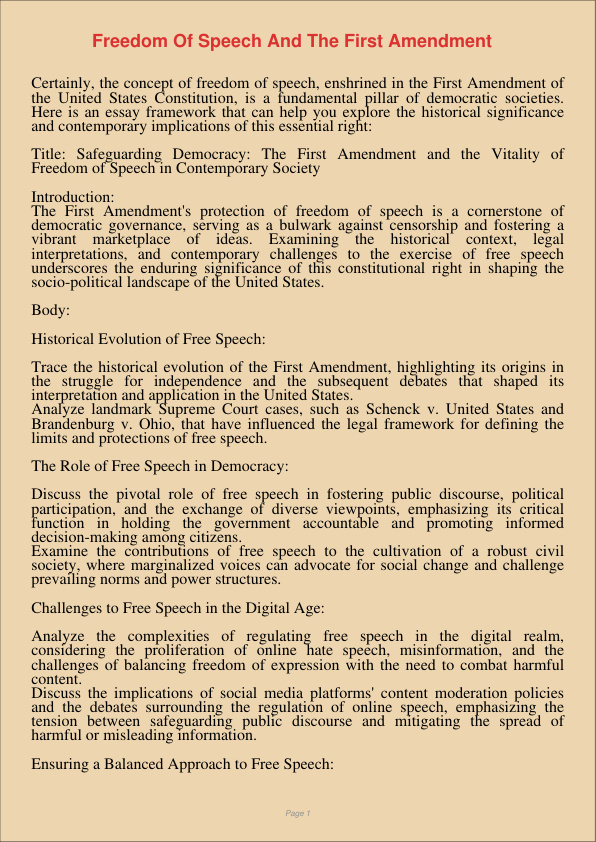Freedom Of Speech And The First Amendment
Jan 12, 2024
first amendment
speech
Family & Consumer Science
English

Certainly, the concept of freedom of speech, enshrined in the First Amendment of the United States Constitution, is a fundamental pillar of democratic societies. Here is an essay framework that can help you explore the historical significance and contemporary implications of this essential right:
Title: Safeguarding Democracy: The First Amendment and the Vitality of Freedom of Speech in Contemporary Society
Introduction: The First Amendment’s protection of freedom of speech is a cornerstone of democratic governance, serving as a bulwark against censorship and fostering a vibrant marketplace of ideas. Examining the historical context, legal interpretations, and contemporary challenges to the exercise of free speech underscores the enduring significance of this constitutional right in shaping the socio-political landscape of the United States.
Body:
Historical Evolution of Free Speech:
Trace the historical evolution of the First Amendment, highlighting its origins in the struggle for independence and the subsequent debates that shaped its interpretation and application in the United States. Analyze landmark Supreme Court cases, such as Schenck v. United States and Brandenburg v. Ohio, that have influenced the legal framework for defining the limits and protections of free speech.
The Role of Free Speech in Democracy:
Discuss the pivotal role of free speech in fostering public discourse, political participation, and the exchange of diverse viewpoints, emphasizing its critical function in holding the government accountable and promoting informed decision-making among citizens. Examine the contributions of free speech to the cultivation of a robust civil society, where marginalized voices can advocate for social change and challenge prevailing norms and power structures.
Challenges to Free Speech in the Digital Age:
Analyze the complexities of regulating free speech in the digital realm, considering the proliferation of online hate speech, misinformation, and the challenges of balancing freedom of expression with the need to combat harmful content. Discuss the implications of social media platforms’ content moderation policies and the debates surrounding the regulation of online speech, emphasizing the tension between safeguarding public discourse and mitigating the spread of harmful or misleading information.
Ensuring a Balanced Approach to Free Speech:
Examine the nuances of balancing free speech protections with the imperative to prevent harm and uphold public safety, emphasizing the importance of implementing targeted regulations that safeguard against hate speech, incitement to violence, and the dissemination of false information. Propose strategies for fostering digital literacy and media literacy education to empower individuals to critically evaluate and navigate the information landscape, fostering responsible and informed engagement with diverse perspectives and ideas.
Preserving the Legacy of Free Speech:
Advocate for the preservation of a robust and inclusive public sphere that upholds the principles of free speech while fostering respect for diverse viewpoints and promoting civil discourse. Emphasize the importance of cultivating a culture of empathy, mutual understanding, and constructive dialogue to uphold the democratic values enshrined in the First Amendment and nurture a more equitable and just society.
Conclusion: Safeguarding the vitality of freedom of speech is essential for the preservation of democratic governance and the cultivation of a pluralistic and inclusive society. By advocating for a nuanced and balanced approach to the exercise of free speech, society can uphold the values of tolerance, civic engagement, and intellectual freedom that underpin the fabric of a thriving democracy.
By utilizing this framework, you can develop an essay that critically examines the historical significance and contemporary implications of freedom of speech, incorporating legal analyses, sociopolitical perspectives, and ethical considerations to underscore the enduring relevance and importance of this fundamental constitutional right.